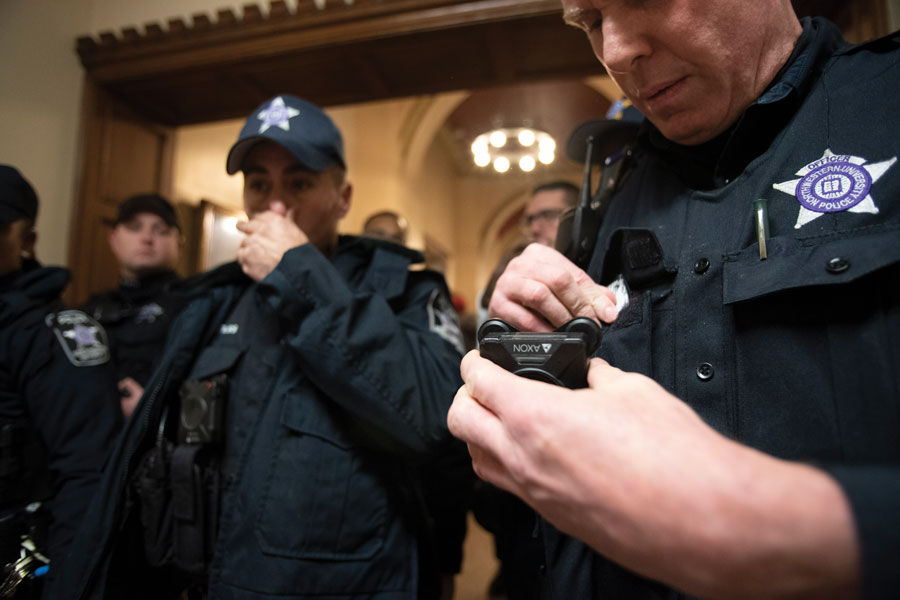Does Northwestern use student media to discipline protestors?
Colin Boyle/Daily Senior Staffer
University police officers formed a shoulder-to-shoulder wall blocking the Lutkin Hall foyer amid protests against former Attorney General Jeff Sessions. Current and former students say they believe Northwestern has used student journalism to identify students for discipline.
November 14, 2019
When student activists protested and attempted to disrupt a speech by former U.S. Attorney General Jeff Sessions, they had history in mind.
In the spring of 2017, with a tip that a public relations officer with Immigration and Customs Enforcement would be speaking to a sociology class, students disrupted the visit, forcing the class to end early without hearing from the ICE representative. The activists said ICE’s presence was dangerous for the undocumented community at Northwestern.
The University decried the disruption, calling protesters’ behavior “disrespectful” and inappropriate.” Participants of the demonstration faced disciplinary action soon after — aided in part by The Daily’s coverage of the event, some student activists said.
Given Northwestern’s history of disciplining students, many student activists who took part in the disruption last week criticized The Daily’s publication of photos of protesters on Twitter. The incident laid bare the strained relationship between journalists and activists on campus, reflecting long-voiced concerns that reporters, in pursuit of the traditional sense of objectivity, fail to practice compassion and empathize with the circumstances of those they write about.
A Daily reporter decided to remove some photos of protesters and the paper’s editorial staff decided to withhold publishing them in the paper in part for this reason, and later revised its original reporting to remove a student’s name. In an apology published days later, the editors said they recognized how they could aid Northwestern administrators in disciplining students.
“Any information The Daily provides about the protest can be used against the participating students — while some universities grant amnesty to student protesters, Northwestern does not,” the editors wrote. “We did not want to play a role in any disciplinary action that could be taken by the University.”
In a statement, University spokesman Bob Rowley said he did not know whether student media has been used in the past to identify protesters and as evidence in the disciplinary process.
“Generally, media are not, and have not been, a primary reporting source for alleged behavioral misconduct,” he said.
But current and former students say they believe Northwestern has used student journalism to identify students for discipline. Some students faced the Student Conduct Process after the 2017 ICE protest because “of a photo from that protest published in the daily,” one former student said.
Activists also pointed to Northwestern’s demonstration policy as exacerbating concerns over being identified through student media.
In fall 2017, the University updated its policy, an act some saw as a response to the ICE protests. The Coalition for Free Speech and Unusual Noise, which formed partially in response to how NU handled the protests, criticized the rules for being ambiguous.
“The language is super vague and can be used in kind of any way the administration would want to apply to any student,” Madisen Hursey, a member of the Coalition, told The Daily at the time. “We didn’t think that was really fair to students who were going to protest, because if you’re going to break a rule, you should at least know what the rule is.”
Mia Mamone, North by Northwestern’s editor in chief, said at least one student group faced punishment after a story in the publication. The magazine had “no idea” the content could get students in trouble, she said, and were only informed when students in the article reached out.
“The school provided no recommendations on how to handle another situation like that if we were to come across it in our reporting again,” she wrote in a message. “I personally find this very disappointing, and wish the university would be more transparent with student journalists about how their stories could be (inadvertently on our part!) used against our peers.There’s a lot we don’t know, and that’s frustrating.”
It’s unclear whether last week’s protesters will be punished. No arrests were made, but Northwestern President Morton Schapiro left open the possibility that they could be punished in the future, saying participants have to “face the consequences.”
Meanwhile, students who participated last week will have to wait to see if they’ll face discipline.
“Any reports of alleged misconduct or policy violations would be shared with the Office of Student Conduct for review and follow-up as appropriate,” Rowley said. “The University protects the right to protest, but if members of the Northwestern community are found to be in violation of University policy, they will be held accountable.”
Email: aperez@u.northwestern.edu
Twitter: @_perezalan_



